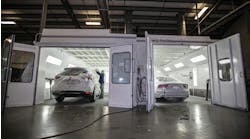Reduced profits concern repairers at Ohio meetings on State Farm pilot program
Reduced parts profits was the biggest concern voiced by more than 125 collision repairers who attended two Automotive Service Association-sponsored meetings recently in Ohio centered around State Farm’s electronic parts ordering pilot.
Like this article? Sign up to receive our weekly news blasts here.Denise Caspersen, manager of ASA’s collision division, presented pilot details, reviewed industry concerns, and collected questions, concerns and suggestions from attendees.
Pilot operations of State Farm’s electronic parts ordering application, which was developed by PartsTrader, are now taking place in Grand Rapids, Mich.; Tucson, Ariz.; Birmingham, Ala.; and Charlotte, N.C. State Farm announced the pilot would expand to Chicago in December.
Repairers are concerned about the pilot’s inclusion of a discounted manufacturer’s suggested retail selling price (MSRP) column. Suppliers have the option to provide a discounted MSRP along with the margins of the part and the quote price. If a supplier elects to provide a discounted MSRP along with a quote for a part, it could result in lower profit margins on parts for the collision repair shop if that part is selected.
State Farm stated in July that it does not ask for discounts on parts but if a supplier provides a discounted MSRP, this data is available to State Farm.
Repairers are responsible for recommending suppliers and determining their default OEM and preferred OEM suppliers. Once a Select Service shop requests a quote on an estimate, the quoting request is sent to all suppliers whose application “preferences” match the content of the estimate. Suppliers, just like repairers, are able to set preferences. Suppliers are also responsible for setting their market area, parts type, and rates of delivery.
Meeting attendees questioned why State Farm is doing this, what happens to repairers’ parts profits if this goes into effect, where is the efficiency, what State Farm sees as the future for collision claims and the size of their Select Service network – and the reigning question overall – where is the benefit to the collision repairers participating in the pilot?
“We continue to present to State Farm the concerns of ASA members. If State Farm cannot provide data showing how this application benefits collision repairers (operationally/financially), ASA will respond appropriately on behalf of repairers,” said Caspersen. “ASA has provided State Farm with a timeline for data and will be meeting with State Farm to assess future actions.”
Collision repairers may share their comments regarding the pilot by contacting Caspersen at [email protected], or by phone at (800) ASA-SHOP, ext. 106, or (817) 514-2906 (direct). ASA announcements addressing the State Farm pilot are located at www.ASAshop.org. Click on “Tools & Resources” (in the blue menu bar), then “State Farm Pilot Program.”
The Automotive Service Association is the largest not-for-profit trade association of its kind dedicated to and governed by independent automotive service and repair professionals. ASA advances professionalism and excellence in the industry through education, representation and member services.
For additional information, including past news releases, go to www.ASAshop.org, or visit ASA’s legislative website at www.TakingTheHill.com.




